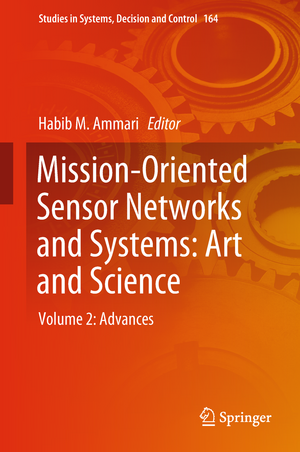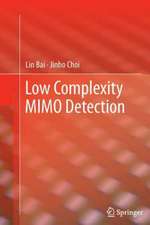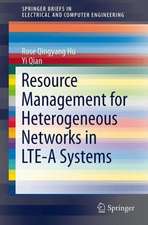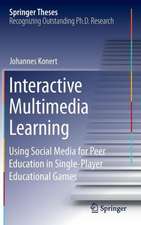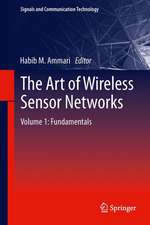Mission-Oriented Sensor Networks and Systems: Art and Science: Volume 2: Advances: Studies in Systems, Decision and Control, cartea 164
Editat de Habib M. Ammarien Limba Engleză Hardback – oct 2019
| Toate formatele și edițiile | Preț | Express |
|---|---|---|
| Hardback (2) | 1247.70 lei 6-8 săpt. | |
| Springer International Publishing – oct 2019 | 1247.70 lei 6-8 săpt. | |
| Springer International Publishing – 8 oct 2019 | 1249.00 lei 6-8 săpt. |
Din seria Studies in Systems, Decision and Control
- 18%
 Preț: 937.89 lei
Preț: 937.89 lei - 18%
 Preț: 729.53 lei
Preț: 729.53 lei - 20%
 Preț: 627.40 lei
Preț: 627.40 lei - 15%
 Preț: 644.18 lei
Preț: 644.18 lei - 18%
 Preț: 900.80 lei
Preț: 900.80 lei - 18%
 Preț: 947.35 lei
Preț: 947.35 lei - 20%
 Preț: 1467.93 lei
Preț: 1467.93 lei - 15%
 Preț: 646.30 lei
Preț: 646.30 lei - 18%
 Preț: 1012.84 lei
Preț: 1012.84 lei - 15%
 Preț: 653.33 lei
Preț: 653.33 lei - 9%
 Preț: 655.01 lei
Preț: 655.01 lei - 20%
 Preț: 835.23 lei
Preț: 835.23 lei - 18%
 Preț: 1112.30 lei
Preț: 1112.30 lei - 20%
 Preț: 934.24 lei
Preț: 934.24 lei - 24%
 Preț: 726.59 lei
Preț: 726.59 lei - 18%
 Preț: 1004.81 lei
Preț: 1004.81 lei - 20%
 Preț: 924.72 lei
Preț: 924.72 lei - 18%
 Preț: 1010.48 lei
Preț: 1010.48 lei - 20%
 Preț: 932.21 lei
Preț: 932.21 lei - 18%
 Preț: 1007.35 lei
Preț: 1007.35 lei - 18%
 Preț: 752.43 lei
Preț: 752.43 lei - 18%
 Preț: 1000.24 lei
Preț: 1000.24 lei - 18%
 Preț: 999.45 lei
Preț: 999.45 lei - 18%
 Preț: 1016.81 lei
Preț: 1016.81 lei - 18%
 Preț: 949.73 lei
Preț: 949.73 lei - 18%
 Preț: 1119.38 lei
Preț: 1119.38 lei - 18%
 Preț: 1412.20 lei
Preț: 1412.20 lei - 20%
 Preț: 1163.21 lei
Preț: 1163.21 lei - 18%
 Preț: 1116.26 lei
Preț: 1116.26 lei - 18%
 Preț: 783.20 lei
Preț: 783.20 lei - 18%
 Preț: 952.09 lei
Preț: 952.09 lei - 20%
 Preț: 1472.54 lei
Preț: 1472.54 lei - 18%
 Preț: 1392.46 lei
Preț: 1392.46 lei - 20%
 Preț: 1180.52 lei
Preț: 1180.52 lei - 18%
 Preț: 1567.67 lei
Preț: 1567.67 lei - 20%
 Preț: 984.18 lei
Preț: 984.18 lei - 20%
 Preț: 369.86 lei
Preț: 369.86 lei - 20%
 Preț: 1281.17 lei
Preț: 1281.17 lei - 18%
 Preț: 1582.67 lei
Preț: 1582.67 lei - 18%
 Preț: 1112.30 lei
Preț: 1112.30 lei - 20%
 Preț: 1055.94 lei
Preț: 1055.94 lei - 18%
 Preț: 1405.90 lei
Preț: 1405.90 lei - 18%
 Preț: 961.55 lei
Preț: 961.55 lei - 20%
 Preț: 1053.48 lei
Preț: 1053.48 lei - 20%
 Preț: 1049.37 lei
Preț: 1049.37 lei - 18%
 Preț: 1005.74 lei
Preț: 1005.74 lei - 18%
 Preț: 1225.94 lei
Preț: 1225.94 lei - 18%
 Preț: 1232.26 lei
Preț: 1232.26 lei
Preț: 1247.70 lei
Preț vechi: 1521.59 lei
-18% Nou
Puncte Express: 1872
Preț estimativ în valută:
238.74€ • 249.27$ • 197.59£
238.74€ • 249.27$ • 197.59£
Carte tipărită la comandă
Livrare economică 04-18 aprilie
Preluare comenzi: 021 569.72.76
Specificații
ISBN-13: 9783319923833
ISBN-10: 3319923838
Pagini: 794
Ilustrații: XVIII, 794 p. 303 illus., 188 illus. in color.
Dimensiuni: 155 x 235 mm
Greutate: 1.31 kg
Ediția:1st ed. 2019
Editura: Springer International Publishing
Colecția Springer
Seria Studies in Systems, Decision and Control
Locul publicării:Cham, Switzerland
ISBN-10: 3319923838
Pagini: 794
Ilustrații: XVIII, 794 p. 303 illus., 188 illus. in color.
Dimensiuni: 155 x 235 mm
Greutate: 1.31 kg
Ediția:1st ed. 2019
Editura: Springer International Publishing
Colecția Springer
Seria Studies in Systems, Decision and Control
Locul publicării:Cham, Switzerland
Cuprins
Introduction.- Autonomous Cooperative Routing for Mission-Critical Applications.- Using Models for Communication in Cyber-Physical Systems.- Urban Micro-Climate Monitoring Using IoT Based Architecture.- Digital Forensics for IoT and WSNs.- An Overview of Wearable Computing.- Wearable Computing and Human Centricity.- Wireless transfer of energy alongside information in wireless sensor networks.- Efficient Protocols for Peer-to-Peer Wireless Power Transfer and Energy Aware Network Formation.- DeepCharge: Next-generation Software-defined Wireless Charging Systems.- Robotic Wireless Sensor Networks.- Robot and Drone Localization in GPS-Denied Areas.- Middleware for Multi-Robot System.- Interference Mitigation Techniques in Wireless Body Area Networks.- Radiation Control Algorithms in Wireless Networks.- Subspace based Encryption.
Textul de pe ultima copertă
This book presents a broad range of deep-learning applications related to vision, natural language processing, gene expression, arbitrary object recognition, driverless cars, semantic image segmentation, deep visual residual abstraction, brain–computer interfaces, big data processing, hierarchical deep learning networks as game-playing artefacts using regret matching, and building GPU-accelerated deep learning frameworks. Deep learning, an advanced level of machine learning technique that combines class of learning algorithms with the use of many layers of nonlinear units, has gained considerable attention in recent times. Unlike other books on the market, this volume addresses the challenges of deep learning implementation, computation time, and the complexity of reasoning and modeling different type of data. As such, it is a valuable and comprehensive resource for engineers, researchers, graduate students and Ph.D. scholars.
Caracteristici
Provides a concise and structured presentation of deep learning applications Introduces a large range of applications related to vision, speech, and natural language processing Includes active research trends, challenges, and future directions of deep learning
